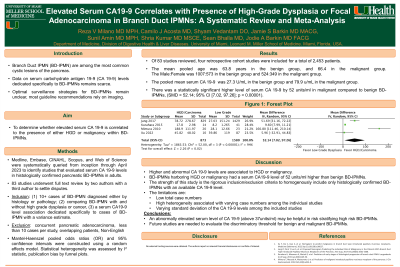Monday Poster Session
Category: Biliary/Pancreas
P1426 - Elevated Serum Carbohydrate Antigen 19-9 Correlates With Presence of High-Grade Dysplasia or Focal Adenocarcinoma in Branch Duct Intrapapillary Mucinous Neoplasms: A Systematic Review and Meta-Analysis
Monday, October 23, 2023
10:30 AM - 4:15 PM PT
Location: Exhibit Hall

Has Audio

Jodie A. Barkin, MD, FACG
University of Miami, Leonard M. Miller School of Medicine
Miami, FL
Presenting Author(s)
Reza V. Milano, MD, MPH1, Camilo J. Acosta, MD1, Shyam Vedantam, DO2, Jamie S. Barkin, MD, MACG1, Sunil Amin, MD, MPH1, Shria Kumar, MD, MSc(Epi)3, Sean Bhalla, MD1, Jodie A. Barkin, MD, FACG1
1University of Miami, Leonard M. Miller School of Medicine, Miami, FL; 2University of Miami/Jackson Memorial Hospital, Miami, FL; 3University of Miami, Miami, FL
Introduction: Branch duct intraductal papillary mucinous neoplasms (BD-IPMNs) are among the most common pancreatic cystic lesions, however, optimal surveillance strategies to identify progression to high-grade dysplasia (HGD) or malignancy in this group of IPMNs remain particularly unclear. Most guidelines for IPMN surveillance focus on radiologic features. There is a paucity of data on serum carbohydrate antigen 19-9 (CA 19-9) levels dedicated specifically to BD-IPMNs. The aim of this systematic review and meta-analysis was to determine whether elevated serum CA 19-9 is correlated to presence of either HGD or malignancy within BD-IPMNs.
Methods: Medline, Embase, CINAHL, Scopus, and Web of Science were systematically queried from inception through April 2023 to identify studies that evaluated serum CA 19-9 levels in histologically confirmed pancreatic BD-IPMNs in adults, with all associated permutations. Eighty-three studies underwent full text review by two authors with a third author to settle disputes. Studies included were English language original studies describing a serum CA 19-9 level for both BD-IPMNs with low grade dysplasia (“benign”), and BD-IPMNs with HGD or carcinoma (combined outcome defined as “malignant”). Mantel-Haenszel pooled odds ratios (OR) and 95% confidence intervals (CI) for these were constructed using a random effects model. Statistical heterogeneity was assessed using the I2 statistic and publication bias was assessed using funnel plots.
Results: Four retrospective cohort studies were included for a total of 2,453 patients. There was a statistically significant difference in the level of serum CA 19-9 between benign and malignant BD-IPMNs, with higher levels found in the malignant group. Serum CA 19-9 level was approximately 52 units/mL higher in malignant vs. benign BD-IPMNs (SMD = 52.14; 95% CI [7.02, 97.26]; p < 0.00001).
Discussion: A significantly higher level of serum CA 19-9 was found in malignant compared to benign BD-IPMNs. Specific serum CA 19-9 cutoff levels for malignancy were unable to be calculated, however our study suggests that any elevation in serum CA 19-9 in a patient with BD-IPMN may be associated with increased risk of HGD/malignancy in BD-IPMNs. Further studies are needed to evaluate the optimal cutoff for elevation of serum CA 19-9 in detecting malignant BD-IPMNs. Serum CA 19-9 may be a useful additive tool in non-invasive surveillance of BD-IPMNs for progression to HGD or malignancy.

Disclosures:
Reza V. Milano, MD, MPH1, Camilo J. Acosta, MD1, Shyam Vedantam, DO2, Jamie S. Barkin, MD, MACG1, Sunil Amin, MD, MPH1, Shria Kumar, MD, MSc(Epi)3, Sean Bhalla, MD1, Jodie A. Barkin, MD, FACG1. P1426 - Elevated Serum Carbohydrate Antigen 19-9 Correlates With Presence of High-Grade Dysplasia or Focal Adenocarcinoma in Branch Duct Intrapapillary Mucinous Neoplasms: A Systematic Review and Meta-Analysis, ACG 2023 Annual Scientific Meeting Abstracts. Vancouver, BC, Canada: American College of Gastroenterology.
1University of Miami, Leonard M. Miller School of Medicine, Miami, FL; 2University of Miami/Jackson Memorial Hospital, Miami, FL; 3University of Miami, Miami, FL
Introduction: Branch duct intraductal papillary mucinous neoplasms (BD-IPMNs) are among the most common pancreatic cystic lesions, however, optimal surveillance strategies to identify progression to high-grade dysplasia (HGD) or malignancy in this group of IPMNs remain particularly unclear. Most guidelines for IPMN surveillance focus on radiologic features. There is a paucity of data on serum carbohydrate antigen 19-9 (CA 19-9) levels dedicated specifically to BD-IPMNs. The aim of this systematic review and meta-analysis was to determine whether elevated serum CA 19-9 is correlated to presence of either HGD or malignancy within BD-IPMNs.
Methods: Medline, Embase, CINAHL, Scopus, and Web of Science were systematically queried from inception through April 2023 to identify studies that evaluated serum CA 19-9 levels in histologically confirmed pancreatic BD-IPMNs in adults, with all associated permutations. Eighty-three studies underwent full text review by two authors with a third author to settle disputes. Studies included were English language original studies describing a serum CA 19-9 level for both BD-IPMNs with low grade dysplasia (“benign”), and BD-IPMNs with HGD or carcinoma (combined outcome defined as “malignant”). Mantel-Haenszel pooled odds ratios (OR) and 95% confidence intervals (CI) for these were constructed using a random effects model. Statistical heterogeneity was assessed using the I2 statistic and publication bias was assessed using funnel plots.
Results: Four retrospective cohort studies were included for a total of 2,453 patients. There was a statistically significant difference in the level of serum CA 19-9 between benign and malignant BD-IPMNs, with higher levels found in the malignant group. Serum CA 19-9 level was approximately 52 units/mL higher in malignant vs. benign BD-IPMNs (SMD = 52.14; 95% CI [7.02, 97.26]; p < 0.00001).
Discussion: A significantly higher level of serum CA 19-9 was found in malignant compared to benign BD-IPMNs. Specific serum CA 19-9 cutoff levels for malignancy were unable to be calculated, however our study suggests that any elevation in serum CA 19-9 in a patient with BD-IPMN may be associated with increased risk of HGD/malignancy in BD-IPMNs. Further studies are needed to evaluate the optimal cutoff for elevation of serum CA 19-9 in detecting malignant BD-IPMNs. Serum CA 19-9 may be a useful additive tool in non-invasive surveillance of BD-IPMNs for progression to HGD or malignancy.

Figure: Figure 1: Forest plot showing elevated serum CA 19-9 level is significantly associated with presence of high-grade dysplasia or adenocarcinoma in BD-IPMNs.
Disclosures:
Reza Milano indicated no relevant financial relationships.
Camilo Acosta indicated no relevant financial relationships.
Shyam Vedantam indicated no relevant financial relationships.
Jamie Barkin indicated no relevant financial relationships.
Sunil Amin: Boston Scientific – Consultant. Medtronic – Consultant.
Shria Kumar indicated no relevant financial relationships.
Sean Bhalla indicated no relevant financial relationships.
Jodie Barkin: AbbVie – Advisor or Review Panel Member. Aimmune Therapeutics, a Nestlé Health Science company – Consultant. CorEvitas, LLC – Advisor or Review Panel Member. Envara Health – Advisor or Review Panel Member. Medtronic – Advisor or Review Panel Member. Organon – Advisor or Review Panel Member.
Reza V. Milano, MD, MPH1, Camilo J. Acosta, MD1, Shyam Vedantam, DO2, Jamie S. Barkin, MD, MACG1, Sunil Amin, MD, MPH1, Shria Kumar, MD, MSc(Epi)3, Sean Bhalla, MD1, Jodie A. Barkin, MD, FACG1. P1426 - Elevated Serum Carbohydrate Antigen 19-9 Correlates With Presence of High-Grade Dysplasia or Focal Adenocarcinoma in Branch Duct Intrapapillary Mucinous Neoplasms: A Systematic Review and Meta-Analysis, ACG 2023 Annual Scientific Meeting Abstracts. Vancouver, BC, Canada: American College of Gastroenterology.
